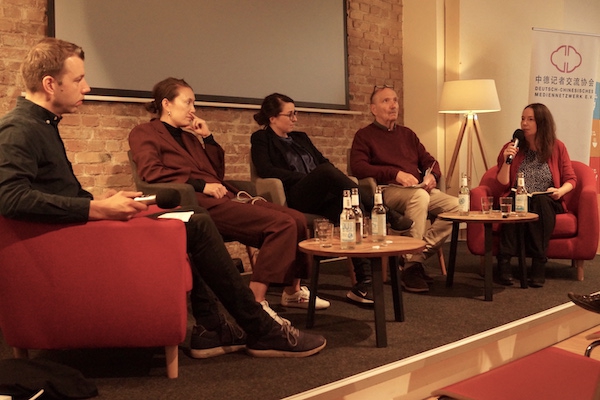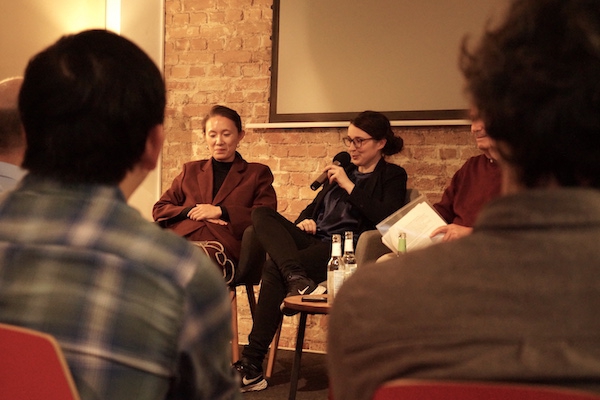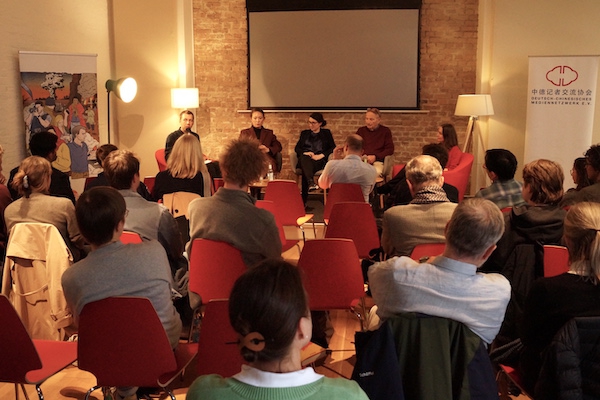Rückblick:
75 Years People's Republic of China: Between Economic Rise, Censorship and Fears for the Future

Guests:
Johnny ERLING, decades-long China correspondent e.g. for Die Welt and Der Standard
Katja DRINHAUSEN, expert for China's legal system, governance and human rights at the Mercator Institute for China Studies (Merics)
Lea SAHAY, Beijing-based China correspondent for Süddeutsche Zeitung
Xifan YANG, China correspondent for Die Zeit in Beijing from 2018 until 2023
Moderator:
Andre ZANTOW, reporter for Deutschlandradio and other media
While the Chinese Communist Party celebrates the founding of the People's Republic of China 75 years ago with a jubilant show in Beijing and success stories on its propaganda channels, journalists.network and the German-Chinese Media Network on 16 September 2024 co-hosted a panel discussion in Berlin with more balanced insights. We asked our guests: Where does China really stand today, after 75 years of communist rule?
It is deeply characterised by a change of course, according to Johnny Erling's assessment. A change of course that began ten years before the German ‘Zeitenwende’ proclaimed by Chancellor Olaf Scholz: with the election of Xi Jinping as General Secretary of the Communist Party in 2012. A turning point, because since then democratic achievements have been reversed, civil rights, freedom of expression and freedom of the press have been curtailed, the country has become increasingly closed off to the outside world and internally has been set on a nationalist course through censorship and propaganda. All this under the slogan of the ‘Chinese Dream’, which aims to make the country a world leader in economic and military terms, says Erling: ‘Unlike the American Dream, the Chinese Dream is not open to all. It is a nationalistic dream: China should become great.’

From Lea Sahay's point of view, many ordinary people initially associated the Chinese Dream with something similar to the American Dream: ‘They associated it with social advancement into the middle class. You can afford a flat and a car. The children study and then work in offices, no longer with their hands.’ However, due to the economic difficulties of recent years, many Chinese people are now disillusioned. Sahay agreed with Erling that the Communist Party is dreaming of something else anyway: ‘It wants to have established China as the world power par excellence by 2049.’
Katja Drinhausen warned against romanticising the boom and awakening years before Xi Jinping came to power. Although there were great economic and social leaps forward at the time, there were also major uncertainties and upheavals. She recalled the ruthless land seizures for property projects, which led to countless protests and suicides, and the dramatic environmental pollution. However, according to Drinhausen: ‘There were media, journalists and citizen networks that reported on all these problems. Influential structures formed in society outside the CP. That worried Xi Jinping.’ And so, from 2012, he set about smashing these structures - through a highly equipped security and surveillance apparatus, media and internet censorship, rigid NGO laws and the imprisonment of civil rights activists and journalists. ‘From the CP's internal perspective, all of this makes sense,’ says Drinhausen. ‘The problem for China is that many of society's correctives have been silenced. And that's why there is no one left today who could tell the emperor if his clothes are no longer visible.’ As some of the major neglected problems she regards the pension system, the high youth unemployment, and the family and social policy.
For Xifan Yang, an implicit deal that seemed to work for decades is at stake in the face of China's major social challenges. ‘The deal between the Communist Party and the Chinese people was: You stay out of politics, but you can get rich.’ According to Yang, the deal has now been cancelled unilaterally. Getting rich no longer really works, but there are virtually no opportunities for democratic participation. A disillusioned, highly dissatisfied generation is growing up in China. ‘It's a very gloomy mood right now.’ Nevertheless, Yang does not believe that the Communist Party needs to worry about maintaining its power in the anniversary year of the People's Republic: ‘The Chinese are good at eating bitterness, as they say.’ In addition, many Western democracies are also currently in crisis. ‘So people don't necessarily see an attractive alternative that would be worth taking to the streets and risking their lives for.’
Text & photos: Markus Wanzeck
